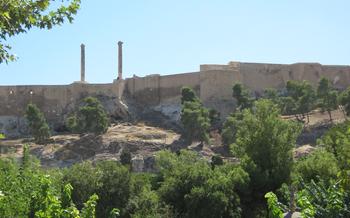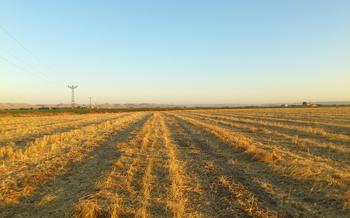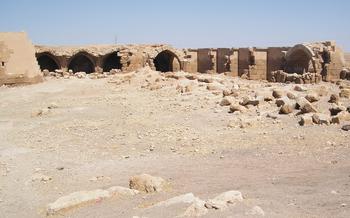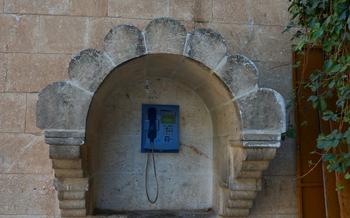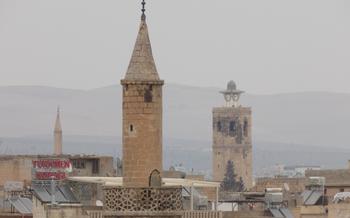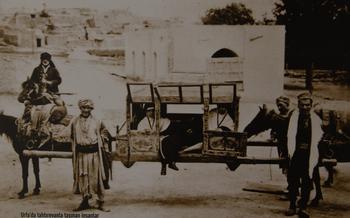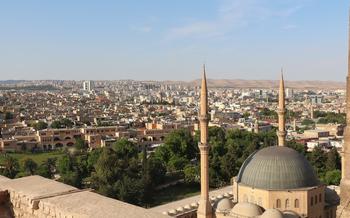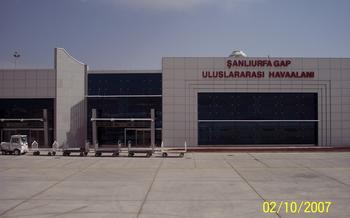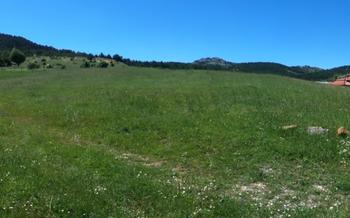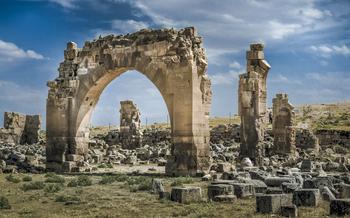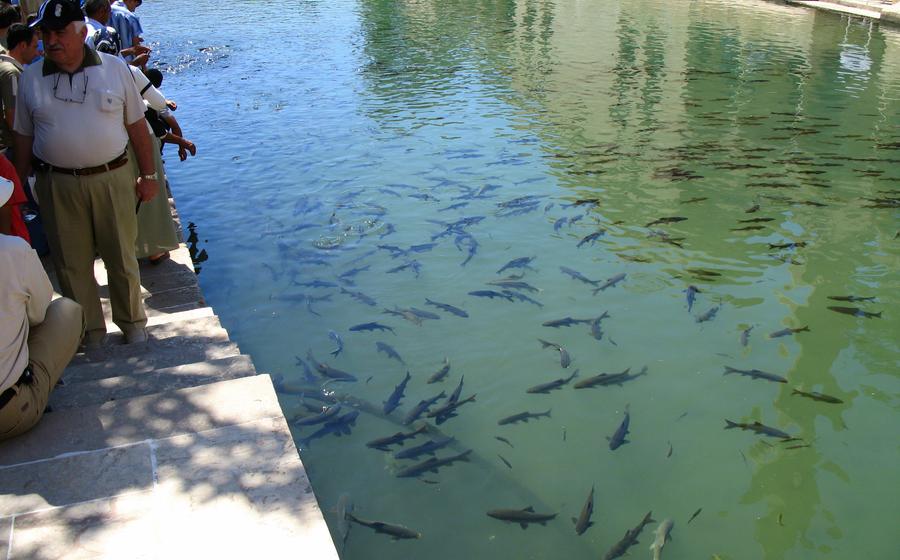
Balıklıgöl (Pool of Sacred Fish)
- A Pool of Sacred Fish
- Location and Accessibility
- Visiting Hours and Admission
- Exploring the Surrounding Area
- Religious Significance
- Local Cuisine
- Handicrafts and Souvenirs
- Accommodations
- Safety and Security
- Photography and Videography
- Cultural Etiquette
- Weather and Climate
- Language and Communication
- Insider Tip: Uncovering Hidden Treasures
A Pool of Sacred Fish
The Balıklıgöl, or Pool of Sacred Fish, is a sacred site in Şanlıurfa, Turkey, holding deep religious significance for Muslims and Christians alike. Its history dates back to the time of Prophet Abraham, who is believed to have sought refuge here with his followers when he was fleeing from Nimrod, a tyrannical king who sought to kill him. According to legend, as Abraham prayed, a spring erupted from the ground, creating a pool that miraculously filled with fish.
The fish in the pool are considered sacred and revered by both Muslims and Christians, who believe that they were created from the tears of Abraham's wife, Sarah, as she wept for her son, Isaac. The fish are a symbol of faith, abundance, and divine protection. Visitors to the Balıklıgöl often make wishes and throw coins into the pool, believing that their wishes will be granted if a fish swallows the coin. The site is a place of pilgrimage and devotion, where people come to pay their respects and seek blessings.
Location and Accessibility
The Balıklıgöl is conveniently located in the heart of Şanlıurfa, making it easily accessible for visitors. The exact address is Balıklıgöl Mahallesi, 63000 Şanlıurfa Merkez/Şanlıurfa. To reach the site, you can take a short walk from the city center or use public transportation. Several bus lines stop near the Balıklıgöl, and there are also taxi stands in the area. For those driving, there is a designated parking lot near the entrance.
If you're exploring Şanlıurfa, the Balıklıgöl is within walking distance of other major attractions. The Şanlıurfa Museum, which houses a collection of artifacts from the region's rich history, is just a few steps away. The Great Mosque of Şanlıurfa, a stunning example of Islamic architecture, is also nearby. Visitors can easily combine a visit to the Balıklıgöl with these other landmarks to create a comprehensive cultural experience.
Whether you choose to walk, take public transportation, or drive, the Balıklıgöl is easily accessible and well-connected to the rest of the city. Guided tours and organized excursions are also available for those who prefer a more structured experience. These tours often include transportation, entrance fees, and a knowledgeable guide to provide insights into the history and significance of the site.
Visiting Hours and Admission
The Balıklıgöl is open to visitors throughout the week, with slightly varying hours depending on the season. During the summer months, from April to October, the site is generally accessible from 8:00 AM to 8:00 PM. In the winter months, from November to March, the hours may be slightly shorter, typically from 9:00 AM to 6:00 PM.
Admission to the Balıklıgöl is free of charge, allowing visitors to explore this sacred site without any financial barriers. This open access policy encourages individuals from all backgrounds to experience the spiritual significance and historical importance of the pool.
It is important to note that the Balıklıgöl may be closed for special events or religious ceremonies on occasion. These closures are usually announced in advance to ensure that visitors are aware of any disruptions.
When visiting the Balıklıgöl, it is essential to dress appropriately out of respect for the religious significance of the site. Visitors should avoid wearing revealing or overly casual clothing, opting for modest attire that covers their shoulders and knees.
By adhering to these guidelines, visitors can fully immerse themselves in the spiritual essence of the Balıklıgöl and appreciate its cultural and historical significance.
Exploring the Surrounding Area
Surrounding the venerable Balıklıgöl, a world of historical landmarks, cultural treasures, and culinary delights awaits exploration. Take a leisurely stroll and discover the majestic Şanlıurfa Castle, a testament to the city's rich past. Immerse yourself in the spiritual ambiance of the Grand Mosque, an architectural masterpiece known for its intricate tilework and serene atmosphere.
For a taste of local life, venture into the vibrant Old Bazaar, a labyrinth of colorful shops selling traditional crafts, spices, and souvenirs. Indulge in the delectable flavors of Şanlıurfa's cuisine at renowned restaurants like Özer Usta or Yemen Khan, savoring mouthwatering kebabs, lahmacun, and other regional specialties.
Embrace the opportunity to travel back in time at the Şanlıurfa Museum, home to an impressive collection of artifacts that narrate the city's ancient history. Unearth the secrets of the past at the Göbekli Tepe, a Neolithic archaeological site that has captivated the world with its mysterious stone circles.
As you wander through the streets, don't miss the chance to delve into the local culinary scene. Savor the aromatic Şanlıurfa kebab, renowned for its tender meat and flavorful spices. Quench your thirst with a refreshing glass of ayran, a traditional yogurt drink, as you soak in the vibrant atmosphere.
Whether you seek historical wonders, cultural immersion, or culinary adventures, the area surrounding Balıklıgöl offers a kaleidoscope of experiences that will captivate and enchant you.
Religious Significance
Şanlıurfa holds a profound religious significance, revered by multiple religions and denominations. It is considered a sacred city, attracting pilgrims and visitors from around the world. The city's history is intertwined with numerous religious figures and events, leaving a lasting impact on its cultural and spiritual landscape.
One of the most notable religious sites in Şanlıurfa is the Cave of Abraham, believed to be the birthplace of the prophet Abraham. This cave, located in the heart of the city, is considered a holy place by both Muslims and Christians, drawing pilgrims and visitors alike.
In addition to its Islamic heritage, Şanlıurfa is also home to a significant Christian population. The city boasts several ancient churches, including the Church of Saint Peter, which is believed to be one of the oldest churches in the world. These churches serve as places of worship and pilgrimage for Christian communities in the region.
Furthermore, Şanlıurfa's religious significance extends beyond Christianity and Islam. The city is also home to a small but vibrant Jewish community, with a historic synagogue that serves as a gathering place for religious and cultural events.
The coexistence of different faiths in Şanlıurfa is a testament to the city's rich religious history and the harmony that exists among its diverse communities. Visitors to Şanlıurfa will find a city where religious traditions are celebrated and respected, creating a unique and spiritually charged atmosphere.
Local Cuisine
Şanlıurfa's culinary scene is a symphony of flavors that tantalizes the taste buds. The city's cuisine is renowned throughout Turkey and beyond for its unique blend of traditional Turkish dishes and influences from neighboring regions. Şanlıurfa's signature dish is the "Urfa kebab," a succulent skewer of seasoned minced lamb grilled to perfection. This delectable dish is often served with grilled vegetables, bulgur pilaf, and a dollop of creamy yogurt, creating a harmonious balance of flavors.
Another must-try delicacy is the "lahmacun," a crispy flatbread topped with minced lamb, tomatoes, onions, and parsley. This savory delight is a popular street food in Şanlıurfa and is enjoyed by locals and tourists alike.
For those with a sweet tooth, Şanlıurfa offers an array of delectable desserts, including "künefe," a shredded wheat pastry filled with molten cheese and drizzled with sweet syrup. Another local favorite is "katmer," a flaky pastry filled with nuts and honey, providing a perfect ending to any meal.
Şanlıurfa's culinary experiences are not limited to its famous dishes. The city's vibrant atmosphere is filled with traditional coffeehouses, where locals gather to sip on aromatic Turkish coffee and engage in lively conversations. Visitors can indulge in the local tradition of "çay," a refreshing black tea served in tulip-shaped glasses, while enjoying the bustling ambiance of the city.
When exploring Şanlıurfa's culinary delights, it's essential to venture beyond the tourist hotspots to discover hidden gems and local favorites. Ask for recommendations from friendly locals, who will happily guide you towards authentic eateries and street food stalls that serve up the true flavors of Şanlıurfa.
Handicrafts and Souvenirs
Şanlıurfa is known for its rich history, and its handicrafts reflect the city's vibrant cultural heritage. Take home a piece of Şanlıurfa by visiting local markets and shops to discover unique handmade products from talented artisans.
-
Distinctive Metalwork: The city is renowned for its intricate metalwork, particularly silver jewelry and copperware. Find stunning necklaces, earrings, and bracelets adorned with intricate designs and precious stones.
-
Handwoven Textiles: Şanlıurfa's textile traditions are a testament to the city's rich cultural heritage. Explore a range of handwoven fabrics, including traditional carpets, kilims, and scarves.
-
Pottery and Ceramics: Discover beautifully crafted pottery and ceramics in Şanlıurfa. From colorful plates and bowls to decorative vases and tiles, these handmade pieces are perfect souvenirs to cherish.
-
Traditional Handicrafts: Don't miss the opportunity to witness artisans at work in local workshops. See how they transform raw materials into exquisite handicrafts, such as hand-painted miniatures, wooden carvings, and leather goods.
-
Culinary Delights: Take home the flavors of Şanlıurfa in the form of local delicacies. Purchase aromatic spices, dried fruits, and sweets like baklava, a symbol of Turkish cuisine.
Accommodations
When planning your stay in Şanlıurfa, there are numerous accommodation options to choose from, catering to various budgets and preferences. Here are some recommendations to make your stay comfortable and convenient:
-
Luxury Hotels: For a luxurious and indulgent experience, consider staying at one of the upscale hotels in the city center. These hotels offer opulent accommodations, exceptional amenities, and often stunning views of the city.
-
Boutique Hotels: For a unique and personalized experience, opt for a charming boutique hotel. These smaller, independently owned hotels often feature distinct designs, intimate settings, and personalized service.
-
Guesthouses: For a budget-friendly option, guesthouses offer comfortable accommodations at affordable rates. These cozy establishments provide basic amenities and a homey atmosphere, allowing you to connect with local culture.
-
Hostels: For backpackers and budget travelers, hostels provide shared dormitory-style rooms at very reasonable prices. Hostels also offer social spaces, kitchens, and communal areas, fostering a sense of community among travelers.
To secure the best deals and discounts, consider booking your accommodation in advance, especially during peak tourist seasons. Online booking platforms and travel agents can help you compare prices and find the most suitable options for your needs.
Safety and Security
Şanlıurfa is generally considered a safe city for travelers, but as with any destination, it is essential to take precautions to ensure your safety. Here are some tips to keep in mind:
-
Be aware of your surroundings: As in any unfamiliar city, pay attention to your surroundings and avoid walking alone in deserted areas at night.
-
Respect local customs: Dress modestly and behave respectfully, especially when visiting religious sites. Avoid public displays of affection, as they may be frowned upon.
-
Be mindful of scams: Like many tourist destinations, Şanlıurfa can attract its share of scammers. Be wary of unsolicited offers for tours or services, and never give out personal information to strangers.
-
Protect your belongings: Keep your valuables close and secure, and avoid leaving them unattended in public places.
-
Learn some basic Turkish: While English is understood in some tourist areas, learning a few basic Turkish phrases can be helpful for communicating with locals and getting around the city.
By following these simple safety tips, you can help ensure that your visit to Şanlıurfa is a safe and enjoyable one.
Photography and Videography
The Balıklıgöl offers a rich tapestry of visual wonders, making it a paradise for photographers and videographers. Capture the mesmerizing sight of thousands of sacred fish swirling in the crystal-clear waters against the backdrop of ancient architecture. Aim your lens at the ornate facades of the surrounding buildings, intricate tilework, and impressive arches that frame this sacred space. Seek out unique angles to showcase the harmonious coexistence of nature and spirituality.
Respect for the religious significance of the site is paramount, so be mindful of photographing individuals engaged in prayer or contemplation. Avoid using flash or disruptive lighting that may disturb the serenity of the environment. Embrace the opportunity to document this sacred site with your camera, but do so with sensitivity and reverence.
Cultural Etiquette
When visiting the Balıklıgöl and other sacred sites in Şanlıurfa, it's essential to be mindful of local customs and traditions to ensure a respectful and enjoyable experience. Here are some cultural etiquette tips to keep in mind:
-
Greetings: When meeting someone for the first time, a handshake is the most common form of greeting. It's customary to say "Merhaba" (pronounced mer-ha-ba), which means "hello" in Turkish.
-
Body Language: Be mindful of your body language, as certain gestures may have different meanings in different cultures. For example, avoid pointing your finger at someone, as it can be considered rude.
-
Dress Code: While there is no strict dress code in Şanlıurfa, dressing modestly is generally appreciated, especially when visiting religious sites. Avoid wearing revealing clothing or shorts above the knee.
-
Respect for Elders: Show respect to elders by addressing them with the honorific "Amca" (pronounced am-ja) for men and "Teyze" (pronounced tey-zeh) for women, which mean "uncle" and "aunt," respectively.
-
Photography: Always ask for permission before taking photos of people, especially women. It's also important to be respectful when taking photos of religious sites.
-
Interacting with Locals: Be open to interacting with locals, as they are generally friendly and welcoming. A smile and a few words of Turkish can go a long way in breaking the ice.
By observing local customs and traditions, you can contribute to a positive and respectful atmosphere for all visitors to Şanlıurfa.
Weather and Climate
Şanlıurfa experiences a continental climate, characterized by hot and dry summers and cold and wet winters. The best time to visit is during the shoulder seasons, spring (April-May) and autumn (September-October), when the weather is pleasant and mild.
During the summer months (June-August), temperatures can soar to over 40°C (104°F), making it uncomfortably hot for outdoor activities. However, the evenings are generally cooler, providing a welcome respite from the daytime heat.
Winters (November-March) can be cold and wet, with temperatures dropping below freezing at night. Snowfall is not uncommon, although it usually melts quickly. It's advisable to pack warm clothing and waterproof gear if visiting during this time.
When packing for your trip, consider the time of year and the activities you plan to do. Lightweight, breathable clothing is recommended for summer, while warm layers are essential for winter. Remember to include comfortable walking shoes, as you'll likely be doing a lot of exploring on foot.
Be prepared for sudden weather changes, especially during the spring and autumn months, when thunderstorms can occur. It's always a good idea to carry an umbrella or a light raincoat with you.
Overall, Şanlıurfa's weather is generally favorable for tourism, allowing visitors to enjoy outdoor activities and explore the city's many attractions throughout the year.
Language and Communication
Şanlıurfa is a predominantly Turkish-speaking city, with a significant Kurdish minority. While English is not widely spoken, many locals in the tourism industry will have a basic understanding of the language. To communicate effectively with locals who may not speak English, it's helpful to learn some basic Turkish phrases. Common greetings like "Merhaba" (hello) and "Teşekkür ederim" (thank you) can go a long way. Non-verbal communication such as gestures and body language can also be useful. A smile and a nod can often convey friendliness and understanding, even if you don't share a common language.
Language barriers are a natural part of traveling, and they can be a great opportunity to learn about different cultures and ways of life. Don't be afraid to embrace the challenge and try to communicate with locals, even if it's just with simple gestures and phrases. You may be surprised at how far a little effort can go.
Here are some helpful phrases and gestures for basic communication in Şanlıurfa:
- Merhaba (Hello)
- Teşekkür ederim (Thank you)
- Evet (Yes)
- Hayır (No)
- Lütfen (Please)
- Affedersiniz (Excuse me)
- Kolay gelsin (Good luck)
- Afiyet olsun (Enjoy your meal)
Remember, the most important thing is to be patient and respectful when communicating with locals who may not speak English. A little effort and a friendly attitude can go a long way in breaking down language barriers and creating meaningful connections.
Insider Tip: Uncovering Hidden Treasures
Beyond the sacred waters of the Balıklıgöl, Şanlıurfa holds a treasure trove of hidden gems waiting to be discovered. One such gem is the Göbeklitepe, an awe-inspiring archaeological site located just 18 kilometers northeast of the city. This ancient temple complex, dating back to 9000 BC, predates Stonehenge and offers a glimpse into the origins of human civilization. Explore its mysterious circular structures, marvel at the intricate carvings, and immerse yourself in the enigmatic atmosphere of this prehistoric wonder.
For a unique culinary experience, venture into the heart of Şanlıurfa's Old Bazaar, where the air is filled with the aromas of traditional Turkish cuisine. Indulge in mouthwatering kebabs, savor the flavors of freshly baked pide bread, and satisfy your sweet tooth with delectable künefe, a local specialty made with shredded filo dough and sweet cheese. The bazaar is a vibrant tapestry of colors, sounds, and scents, offering a glimpse into the city's rich culinary heritage.
If you seek tranquility amidst the bustling city, find solace in the serene Dara Antik Kenti, located just 25 kilometers away. This ancient city, once a thriving hub of the Roman Empire, boasts well-preserved ruins, including a majestic amphitheater, a colonnaded street, and intricate mosaics. As you wander through the ruins, imagine the grandeur of the past and feel the weight of history beneath your feet.
Şanlıurfa is a city that rewards the curious traveler with hidden gems around every corner. Embrace the spirit of exploration, seek out the unknown, and let the city unveil its secrets to you.
